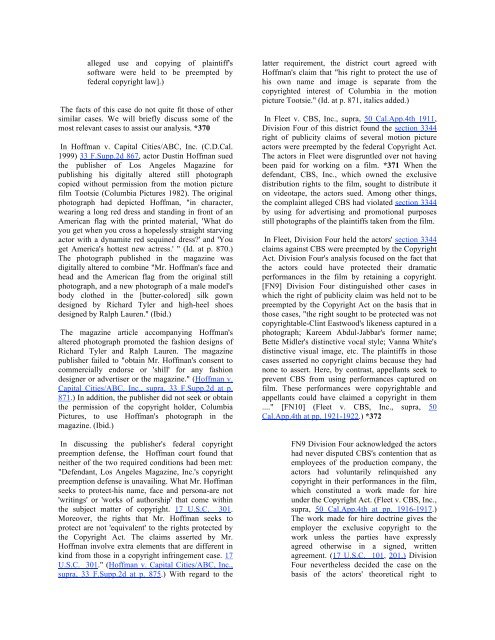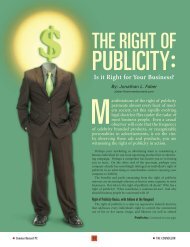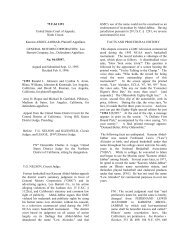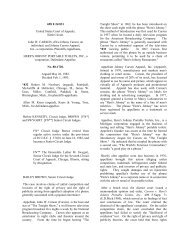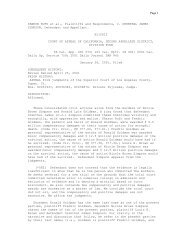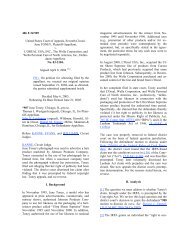KNB ENTERPRISES, Plaintiff and Appellant, v ... - Right Of Publicity
KNB ENTERPRISES, Plaintiff and Appellant, v ... - Right Of Publicity
KNB ENTERPRISES, Plaintiff and Appellant, v ... - Right Of Publicity
Create successful ePaper yourself
Turn your PDF publications into a flip-book with our unique Google optimized e-Paper software.
alleged use <strong>and</strong> copying of plaintiff's<br />
software were held to be preempted by<br />
federal copyright law].)<br />
The facts of this case do not quite fit those of other<br />
similar cases. We will briefly discuss some of the<br />
most relevant cases to assist our analysis. *370<br />
In Hoffman v. Capital Cities/ABC, Inc. (C.D.Cal.<br />
1999) 33 F.Supp.2d 867, actor Dustin Hoffman sued<br />
the publisher of Los Angeles Magazine for<br />
publishing his digitally altered still photograph<br />
copied without permission from the motion picture<br />
film Tootsie (Columbia Pictures 1982). The original<br />
photograph had depicted Hoffman, "in character,<br />
wearing a long red dress <strong>and</strong> st<strong>and</strong>ing in front of an<br />
American flag with the printed material, 'What do<br />
you get when you cross a hopelessly straight starving<br />
actor with a dynamite red sequined dress' <strong>and</strong> 'You<br />
get America's hottest new actress.' " (Id. at p. 870.)<br />
The photograph published in the magazine was<br />
digitally altered to combine "Mr. Hoffman's face <strong>and</strong><br />
head <strong>and</strong> the American flag from the original still<br />
photograph, <strong>and</strong> a new photograph of a male model's<br />
body clothed in the [butter-colored] silk gown<br />
designed by Richard Tyler <strong>and</strong> high-heel shoes<br />
designed by Ralph Lauren." (Ibid.)<br />
The magazine article accompanying Hoffman's<br />
altered photograph promoted the fashion designs of<br />
Richard Tyler <strong>and</strong> Ralph Lauren. The magazine<br />
publisher failed to "obtain Mr. Hoffman's consent to<br />
commercially endorse or 'shill' for any fashion<br />
designer or advertiser or the magazine." (Hoffman v.<br />
Capital Cities/ABC, Inc., supra, 33 F.Supp.2d at p.<br />
871.) In addition, the publisher did not seek or obtain<br />
the permission of the copyright holder, Columbia<br />
Pictures, to use Hoffman's photograph in the<br />
magazine. (Ibid.)<br />
In discussing the publisher's federal copyright<br />
preemption defense, the Hoffman court found that<br />
neither of the two required conditions had been met:<br />
"Defendant, Los Angeles Magazine, Inc.'s copyright<br />
preemption defense is unavailing. What Mr. Hoffman<br />
seeks to protect-his name, face <strong>and</strong> persona-are not<br />
'writings' or 'works of authorship' that come within<br />
the subject matter of copyright. 17 U.S.C. 301.<br />
Moreover, the rights that Mr. Hoffman seeks to<br />
protect are not 'equivalent' to the rights protected by<br />
the Copyright Act. The claims asserted by Mr.<br />
Hoffman involve extra elements that are different in<br />
kind from those in a copyright infringement case. 17<br />
U.S.C. 301." (Hoffman v. Capital Cities/ABC, Inc.,<br />
supra, 33 F.Supp.2d at p. 875.) With regard to the<br />
latter requirement, the district court agreed with<br />
Hoffman's claim that "his right to protect the use of<br />
his own name <strong>and</strong> image is separate from the<br />
copyrighted interest of Columbia in the motion<br />
picture Tootsie." (Id. at p. 871, italics added.)<br />
In Fleet v. CBS, Inc., supra, 50 Cal.App.4th 1911,<br />
Division Four of this district found the section 3344<br />
right of publicity claims of several motion picture<br />
actors were preempted by the federal Copyright Act.<br />
The actors in Fleet were disgruntled over not having<br />
been paid for working on a film. *371 When the<br />
defendant, CBS, Inc., which owned the exclusive<br />
distribution rights to the film, sought to distribute it<br />
on videotape, the actors sued. Among other things,<br />
the complaint alleged CBS had violated section 3344<br />
by using for advertising <strong>and</strong> promotional purposes<br />
still photographs of the plaintiffs taken from the film.<br />
In Fleet, Division Four held the actors' section 3344<br />
claims against CBS were preempted by the Copyright<br />
Act. Division Four's analysis focused on the fact that<br />
the actors could have protected their dramatic<br />
performances in the film by retaining a copyright.<br />
[FN9] Division Four distinguished other cases in<br />
which the right of publicity claim was held not to be<br />
preempted by the Copyright Act on the basis that in<br />
those cases, "the right sought to be protected was not<br />
copyrightable-Clint Eastwood's likeness captured in a<br />
photograph; Kareem Abdul-Jabbar's former name;<br />
Bette Midler's distinctive vocal style; Vanna White's<br />
distinctive visual image, etc. The plaintiffs in those<br />
cases asserted no copyright claims because they had<br />
none to assert. Here, by contrast, appellants seek to<br />
prevent CBS from using performances captured on<br />
film. These performances were copyrightable <strong>and</strong><br />
appellants could have claimed a copyright in them<br />
...." [FN10] (Fleet v. CBS, Inc., supra, 50<br />
Cal.App.4th at pp. 1921-1922.) *372<br />
FN9 Division Four acknowledged the actors<br />
had never disputed CBS's contention that as<br />
employees of the production company, the<br />
actors had voluntarily relinquished any<br />
copyright in their performances in the film,<br />
which constituted a work made for hire<br />
under the Copyright Act. (Fleet v. CBS, Inc.,<br />
supra, 50 Cal.App.4th at pp. 1916-1917.)<br />
The work made for hire doctrine gives the<br />
employer the exclusive copyright to the<br />
work unless the parties have expressly<br />
agreed otherwise in a signed, written<br />
agreement. (17 U.S.C. 101, 201.) Division<br />
Four nevertheless decided the case on the<br />
basis of the actors' theoretical right to


